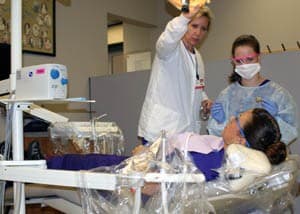UAMS and Partners Celebrate Water Fluoridation Law
March 15, 2011 | Public health leaders from the University of Arkansas for Medical Sciences and other advocacy groups say recent legislation mandating water fluoridation is the most crucial public health effort of the current legislative session. Leaders from UAMS backed Act 197, which requires Arkansas cities with more than 5,000 residents to fluoridate their water supply. Delta Dental pledged it would provide $500,000 to cover start-up costs for the 32 communities that would be affected by the bill. Proponents said studies show lower rates of tooth decay in communities that fluoridate, and said fluoride can be a safe and effective additive with lasting effects on the state health care budget. The bill was signed into law March 4 by Gov. Mike Beebe. Jim Raczynski, Ph.D., dean of the UAMS Fay W. Boozman College of Public Health, said the effects of the legislation will reach statewide. “Our mission within the College of Public Health is to serve and improve health care standards for the people of Arkansas,” Raczynski said. “We strongly believe this law will promote public health in the state and save state Medicaid dollars in the long run.” UAMS joined several health advocate organizations in support of the bill, including the Arkansas State Dental Association, the American Dental Association and Arkansas Advocates for Children and Families. State Sen. David Johnson’s bill, also endorsed by the House Public Health, Welfare and Labor Committee, will ensure that cities like Fort Smith and Hot Springs will join the ranks of Little Rock and Fayetteville in fluoridating their public water supply. Raczynski said the bill will promote dental health. “Only about 60 percent of Arkansans already have fluoridated water,” Raczynski said. “This bill will ensure that number will rise to more than 80 percent. I would say that will have a significant public health impact, specifically from a dental health perspective, on the state’s population.” |
